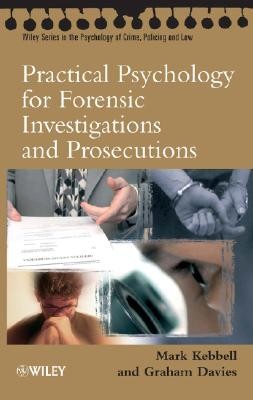| Practical Psychology for Foren Contributor(s): Kebbell, Mark R. (Editor), Davies, Graham M. (Editor) |
|
 |
ISBN: 0470092149 ISBN-13: 9780470092149 Publisher: Wiley OUR PRICE: $90.04 Product Type: Paperback - Other Formats Published: October 2006 Annotation: Despite important technological advances, most forensic investigations and prosecutions still rely heavily upon human factors. It is in understanding these human factors that psychology has a major role to play. This book brings together cutting-edge researchers in forensic psychology to show how psychological knowledge can be applied to investigating and prosecuting offences. It takes a holistic approach, linking together the different stages of the investigation and prosecution processes, demonstrating what psychology can contribute at each stage. The links between maximising reporting rates, thorough investigation, proper presentation of evidence in court, and of effective sentencing policy are examined. Potential pitfalls for the investigative and prosecution process are outlined and ways of overcoming these problems discussed. "Practical Psychology for Forensic Investigations and Prosecutions" describes contemporary research but it is also immensely practical. Written for police officers, lawyers, forensic psychologists and social workers, it will also be a valuable resource for all psychology students who wish to see how psychology can assist policing and the law |
| Additional Information |
| BISAC Categories: - Psychology | Forensic Psychology - Medical | Forensic Medicine |
| Dewey: 614.15 |
| LCCN: 2006014663 |
| Series: Wiley Series in the Psychology of Crime, Policing and Law |
| Physical Information: 0.53" H x 8.55" W x 6.02" (0.79 lbs) 248 pages |
| Descriptions, Reviews, Etc. |
| Publisher Description: This book it is a comprehensive guide, aimed at professionals, that starts with the interview of the victim of the crime, moving through the interviewing of suspects, to the decision to prosecute and enhancing the quality of evidence presented in court. Other topics discussed include: false allegations, false confessions, offender profiling and victim support. Throughout, the theme of the book is that the chain of events leading to the successful investigation and prosecution of offences is only as strong as the weakest link, and should be considered as a coherent whole. |